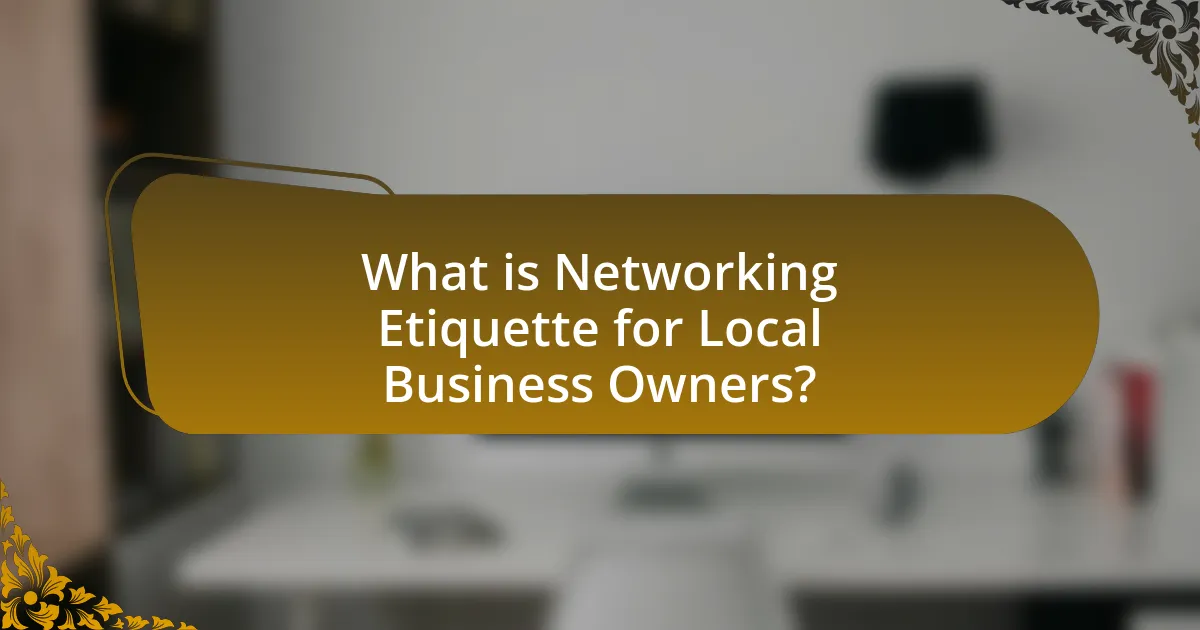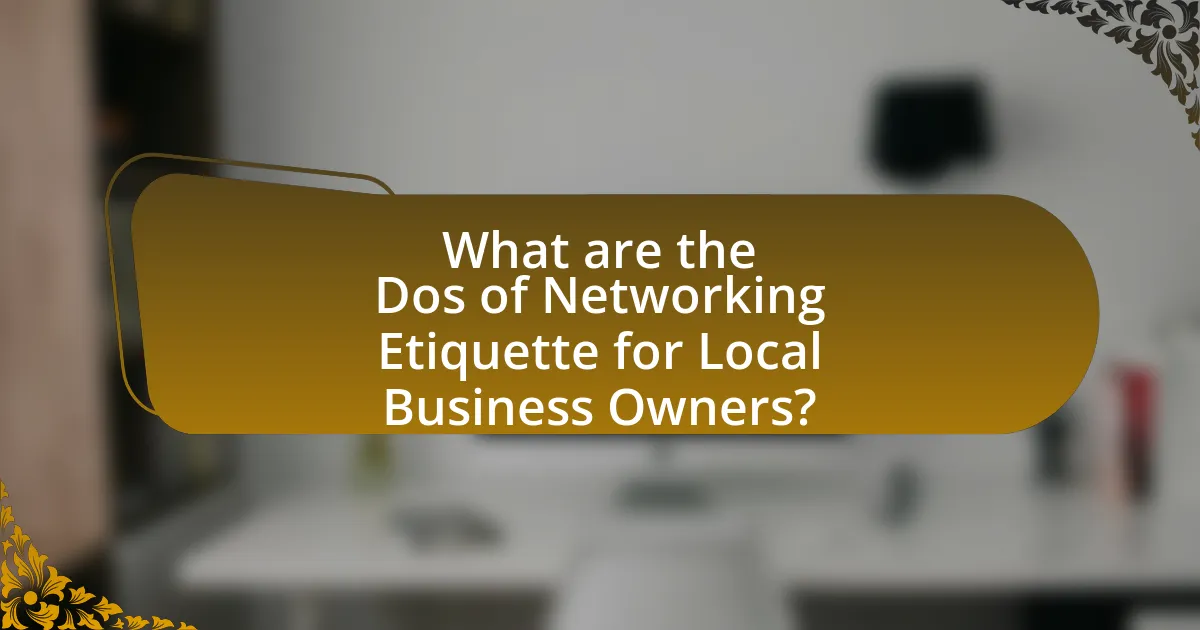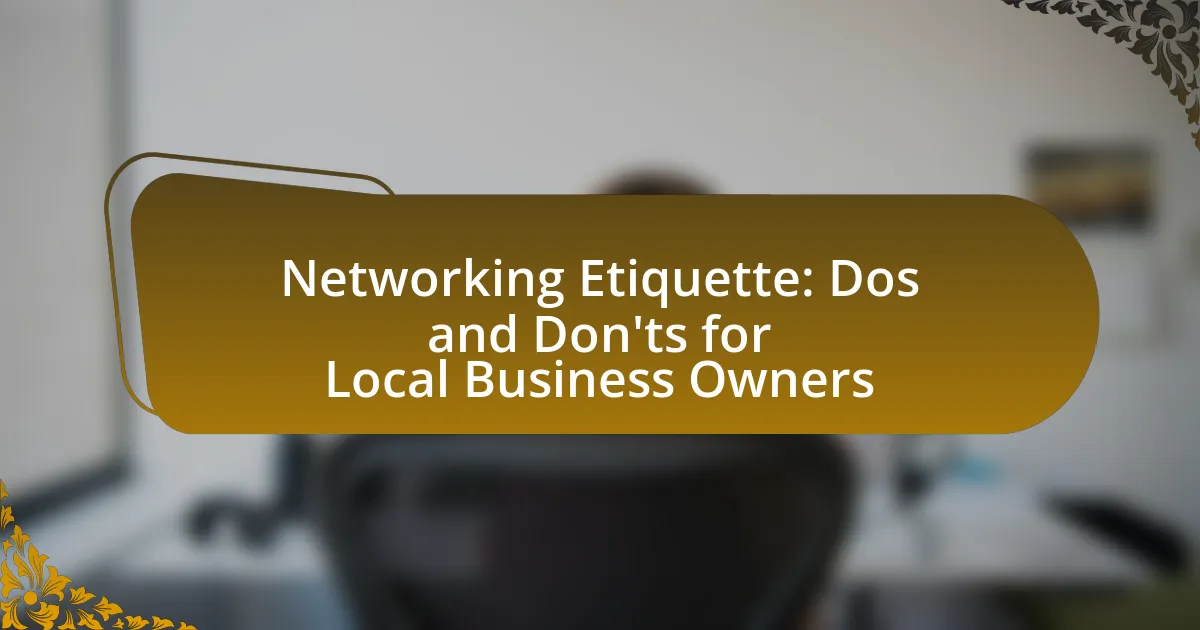Networking etiquette is essential for local business owners, encompassing respectful communication, active listening, and the cultivation of genuine relationships. This article outlines the importance of proper networking etiquette, highlighting its role in building trust and enhancing professional reputation, as well as the potential consequences of poor etiquette, such as lost opportunities and damaged relationships. Key principles include effective introductions, active listening, and timely follow-ups, while common mistakes to avoid involve dominating conversations and excessive self-promotion. The article also provides practical tips for improving networking skills and emphasizes the significance of preparation and respectful behavior in fostering successful business connections.

What is Networking Etiquette for Local Business Owners?
Networking etiquette for local business owners involves respectful communication, active listening, and building genuine relationships. Business owners should introduce themselves clearly, maintain eye contact, and engage in meaningful conversations to establish rapport. Additionally, following up with contacts after networking events demonstrates professionalism and interest. According to a study by the Harvard Business Review, effective networking can lead to increased business opportunities and partnerships, highlighting the importance of proper etiquette in fostering beneficial connections.
Why is Networking Etiquette Important for Local Business Owners?
Networking etiquette is important for local business owners because it fosters positive relationships and enhances professional reputation. Proper etiquette, such as timely follow-ups and respectful communication, helps build trust and credibility within the community. According to a study by the Harvard Business Review, effective networking can lead to increased opportunities, with 70% of jobs being filled through networking. This demonstrates that adhering to networking etiquette not only strengthens connections but also directly impacts business success.
How does Networking Etiquette impact business relationships?
Networking etiquette significantly impacts business relationships by establishing trust and professionalism. Proper etiquette, such as timely follow-ups and respectful communication, fosters positive impressions and encourages collaboration. Research indicates that 85% of jobs are filled through networking, highlighting the importance of maintaining good relationships through appropriate etiquette. Additionally, a study by the Harvard Business Review found that effective networking can lead to increased opportunities and partnerships, reinforcing the idea that etiquette plays a crucial role in the success of business interactions.
What are the consequences of poor Networking Etiquette?
Poor networking etiquette can lead to significant negative consequences, including damaged professional relationships and lost business opportunities. When individuals fail to adhere to basic networking norms, such as timely follow-ups or respectful communication, they risk alienating potential partners and clients. Research indicates that 70% of jobs are found through networking, highlighting the importance of maintaining a positive reputation within professional circles. Additionally, poor etiquette can result in a lack of referrals, as individuals are less likely to recommend someone who has demonstrated unprofessional behavior.
What are the Key Principles of Networking Etiquette?
The key principles of networking etiquette include being respectful, maintaining professionalism, and fostering genuine connections. Respectful behavior involves listening actively, acknowledging others’ contributions, and being mindful of personal space. Professionalism is demonstrated through appropriate attire, punctuality, and clear communication. Fostering genuine connections requires showing interest in others, following up after meetings, and offering assistance when possible. These principles are essential for building lasting relationships and enhancing one’s reputation in a networking environment.
How can local business owners effectively introduce themselves?
Local business owners can effectively introduce themselves by clearly stating their name, business name, and the services or products they offer. This concise introduction allows for immediate recognition and understanding of their role in the community. For instance, saying, “I am Jane Doe, owner of Doe’s Bakery, where we specialize in organic pastries,” provides essential information that can spark interest and conversation. Research indicates that clear and direct introductions enhance networking opportunities, as they facilitate better recall and engagement among potential clients and partners.
What role does active listening play in Networking Etiquette?
Active listening is crucial in networking etiquette as it fosters genuine connections and demonstrates respect for others. By actively engaging in conversations, individuals show that they value the perspectives and insights of their networking partners. This practice not only enhances communication but also builds trust, which is essential for successful networking. Research indicates that effective listening can lead to improved relationship-building, as it encourages open dialogue and collaboration, ultimately benefiting local business owners in their networking efforts.
What are Common Networking Etiquette Mistakes to Avoid?
Common networking etiquette mistakes to avoid include failing to follow up after initial meetings, neglecting to listen actively, and being overly self-promotional. Following up is crucial as it reinforces connections; research shows that 80% of sales require five follow-ups after the initial meeting. Active listening fosters genuine relationships, while excessive self-promotion can alienate potential contacts, as 70% of professionals prefer engaging with those who show interest in them rather than those who only talk about themselves.
Why is it important to avoid interrupting others during conversations?
Avoiding interruptions during conversations is crucial for effective communication and relationship building. When individuals refrain from interrupting, they demonstrate respect for the speaker, which fosters a positive environment conducive to open dialogue. Research indicates that active listening, which includes not interrupting, enhances understanding and retention of information, leading to more productive interactions. According to a study published in the Journal of Applied Psychology, effective communication skills, including listening without interruption, are linked to better teamwork and collaboration outcomes in professional settings.
How can over-promoting oneself damage networking opportunities?
Over-promoting oneself can damage networking opportunities by creating a perception of insincerity and self-centeredness. When individuals excessively highlight their achievements or services, they risk alienating potential connections who may view them as more interested in self-promotion than in building mutually beneficial relationships. Research indicates that effective networking relies on reciprocity and genuine engagement; thus, over-promotion can lead to a lack of trust and reduced willingness from others to engage. For instance, a study published in the Journal of Business and Psychology found that individuals who focus excessively on self-promotion are often perceived as less likable and less trustworthy, which directly impacts their networking success.

What are the Dos of Networking Etiquette for Local Business Owners?
Local business owners should prioritize building genuine relationships, actively listening, and following up after networking events. Establishing authentic connections fosters trust and collaboration, which are essential for business growth. Active listening demonstrates respect and interest in others’ perspectives, enhancing rapport. Following up with personalized messages or invitations to meet again solidifies connections and shows commitment. These practices are supported by research indicating that strong networking relationships can lead to increased referrals and business opportunities.
How should local business owners prepare for networking events?
Local business owners should prepare for networking events by researching attendees and creating a clear elevator pitch. Researching attendees allows business owners to identify potential partners or clients, enhancing the effectiveness of their networking efforts. A well-crafted elevator pitch succinctly communicates their business value, making it easier to engage in meaningful conversations. According to a study by the Harvard Business Review, effective networking can lead to increased business opportunities and partnerships, underscoring the importance of preparation in achieving networking success.
What materials should be brought to a networking event?
To a networking event, individuals should bring business cards, a notepad, and a pen. Business cards facilitate easy sharing of contact information, which is essential for follow-up communication. A notepad allows attendees to jot down important details, such as names, company information, and key discussion points, enhancing memory retention and future interactions. A pen is necessary for writing notes or exchanging information on the spot. These materials collectively support effective networking and relationship-building, which are crucial for local business owners.
How can business owners follow up effectively after networking?
Business owners can follow up effectively after networking by sending personalized messages within 24 to 48 hours of the initial meeting. This promptness demonstrates professionalism and reinforces the connection made during the networking event. Personalization can include referencing specific topics discussed or shared interests, which helps to strengthen the relationship. According to a study by the Harvard Business Review, timely follow-ups can increase the likelihood of a positive response by up to 50%. Additionally, utilizing multiple channels, such as email and social media, can enhance visibility and engagement, making it easier for the recipient to respond.
What behaviors exemplify good Networking Etiquette?
Good networking etiquette includes being respectful, attentive, and genuine in interactions. Respectful behavior involves listening actively, maintaining eye contact, and avoiding interruptions during conversations. Attentiveness is demonstrated by remembering names and details shared by others, which fosters stronger connections. Genuine interactions are characterized by authenticity and a willingness to help others without expecting immediate returns. These behaviors are essential as they build trust and rapport, which are crucial for successful networking in business environments.
How can showing genuine interest in others enhance networking?
Showing genuine interest in others enhances networking by fostering trust and building meaningful relationships. When individuals actively listen and engage with others, they create a positive impression that encourages reciprocal interest and collaboration. Research indicates that networking effectiveness increases when people feel valued and understood, leading to stronger connections and potential business opportunities. For instance, a study published in the Journal of Business and Psychology found that networking success is significantly correlated with the quality of interpersonal relationships, highlighting the importance of authentic engagement in professional settings.
What are the benefits of being respectful and courteous in networking?
Being respectful and courteous in networking fosters stronger relationships and enhances professional reputation. Respectful interactions create a positive impression, leading to increased trust and collaboration opportunities. According to a study published in the Journal of Business and Psychology, professionals who exhibit courteous behavior are perceived as more competent and are more likely to receive referrals and support from their network. This demonstrates that respectful networking not only builds rapport but also contributes to long-term career success and business growth.
What are the Don’ts of Networking Etiquette for Local Business Owners?
Local business owners should avoid several key networking etiquette mistakes. Firstly, they should not dominate conversations; effective networking involves listening as much as speaking. Secondly, they must refrain from being overly aggressive in promoting their business, as this can alienate potential connections. Additionally, local business owners should avoid neglecting follow-ups after initial meetings, as timely communication is crucial for building relationships. Lastly, they should not engage in negative talk about competitors, as this reflects poorly on their professionalism and can damage their reputation. These practices are essential for fostering positive and productive networking experiences.
What actions should local business owners avoid during networking?
Local business owners should avoid being overly aggressive in promoting their products or services during networking events. This behavior can alienate potential connections and create a negative impression. Instead, business owners should focus on building relationships and engaging in meaningful conversations. Research indicates that effective networking relies on mutual interest and rapport, rather than hard selling, which can lead to more fruitful business relationships over time.
Why is it detrimental to dominate conversations?
Dominating conversations is detrimental because it stifles open communication and alienates others. When one person monopolizes dialogue, it prevents diverse perspectives from being shared, which can lead to misunderstandings and a lack of collaboration. Research indicates that effective networking relies on mutual exchange; for instance, a study published in the Journal of Business Communication found that balanced conversations foster stronger relationships and enhance trust among participants. Therefore, dominating discussions undermines the very essence of networking, which is to build connections through shared dialogue.
How can being unprepared reflect poorly on a business owner?
Being unprepared can reflect poorly on a business owner by undermining their credibility and professionalism. When a business owner fails to adequately prepare for networking events, it can lead to missed opportunities for meaningful connections, as they may struggle to engage in relevant conversations or present their business effectively. Research indicates that 70% of networking success is attributed to preparation, highlighting the importance of being ready to discuss one’s business and industry knowledge. This lack of preparedness can result in a negative perception among peers and potential clients, ultimately damaging the owner’s reputation and hindering business growth.
What are the signs of poor Networking Etiquette?
Signs of poor networking etiquette include interrupting others during conversations, failing to follow up after initial meetings, and not respecting personal space. Interrupting disrupts the flow of dialogue and shows a lack of consideration for the speaker. Neglecting to follow up can signal disinterest or unprofessionalism, as it misses the opportunity to build relationships. Additionally, invading personal space can make others uncomfortable and reflects a disregard for social boundaries. These behaviors can hinder effective networking and damage professional relationships.
How can body language indicate a lack of Networking Etiquette?
Body language can indicate a lack of networking etiquette through behaviors such as avoiding eye contact, crossing arms, and fidgeting. These actions suggest disinterest or discomfort, which can create a negative impression during networking interactions. For instance, avoiding eye contact may signal a lack of confidence or engagement, while crossed arms can be interpreted as defensiveness or closed-off behavior. Research shows that nonverbal cues account for a significant portion of communication, with studies indicating that up to 93% of communication effectiveness is derived from nonverbal signals. Therefore, negative body language can undermine the intent to build professional relationships and convey respect in networking situations.
What verbal cues suggest someone is not following Networking Etiquette?
Verbal cues that suggest someone is not following networking etiquette include interrupting others, dominating the conversation, and failing to ask questions. Interrupting indicates a lack of respect for the speaker’s thoughts, while dominating the conversation shows an unwillingness to engage in a two-way dialogue. Additionally, not asking questions can signal disinterest in the other person’s perspective, which is crucial in networking situations. These behaviors can hinder relationship-building and create a negative impression, as effective networking relies on mutual respect and engagement.
What are the best practices for maintaining Networking Etiquette?
The best practices for maintaining networking etiquette include being respectful, listening actively, and following up promptly. Respectful behavior involves acknowledging others’ time and contributions, which fosters a positive environment. Active listening demonstrates genuine interest in conversations, allowing for meaningful connections. Following up promptly after meetings or introductions reinforces relationships and shows professionalism. These practices are essential for building trust and rapport in networking situations, ultimately enhancing business opportunities.
How can local business owners continuously improve their networking skills?
Local business owners can continuously improve their networking skills by actively participating in community events and professional organizations. Engaging in local chambers of commerce or industry-specific groups allows business owners to meet potential clients and partners, enhancing their visibility and credibility. Research shows that 85% of jobs are filled through networking, highlighting its importance in business growth. Additionally, seeking feedback from peers and mentors can provide insights into effective networking strategies, further refining their approach.
What resources are available for learning more about Networking Etiquette?
Books, online courses, and articles are valuable resources for learning about Networking Etiquette. Notable books include “Never Eat Alone” by Keith Ferrazzi, which emphasizes the importance of building relationships in networking, and “The Art of Networking” by David A. Hennessey, which provides practical tips. Online platforms like Coursera and LinkedIn Learning offer courses specifically focused on networking skills and etiquette. Additionally, websites such as Forbes and Harvard Business Review publish articles that discuss best practices and common pitfalls in networking. These resources collectively provide comprehensive insights into effective networking etiquette for local business owners.
What practical tips can local business owners implement for effective networking?
Local business owners can implement several practical tips for effective networking, including attending community events, joining local business organizations, and utilizing social media platforms. Attending community events allows business owners to meet potential clients and partners face-to-face, fostering personal connections that can lead to future collaborations. Joining local business organizations, such as chambers of commerce, provides access to networking opportunities and resources that can enhance visibility and credibility within the community. Utilizing social media platforms, particularly LinkedIn, enables business owners to connect with other professionals, share insights, and promote their services, thereby expanding their network beyond geographical limitations. These strategies are supported by research indicating that personal connections and active participation in local business communities significantly enhance networking success.
